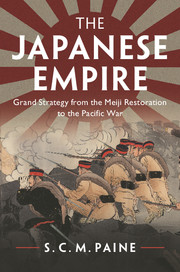Refine search
Actions for selected content:
15418 results in Military history

The Japanese Empire
- Grand Strategy from the Meiji Restoration to the Pacific War
-
- Published online:
- 31 March 2017
- Print publication:
- 06 March 2017
Chapter 15 - Papua’s overlooked legacy
- from Part 5 - Legacies
-
-
- Book:
- Kokoda
- Published online:
- 12 September 2017
- Print publication:
- 27 March 2017, pp 266-287
-
- Chapter
- Export citation
Chapter 3 - Confrontation in the Coral Sea
- from Part 1 - Turning points
-
-
- Book:
- Kokoda
- Published online:
- 12 September 2017
- Print publication:
- 27 March 2017, pp 48-67
-
- Chapter
- Export citation
Chapter 13 - On the trail of an extraordinary man
- from Part 4 - On the trail
-
-
- Book:
- Kokoda
- Published online:
- 12 September 2017
- Print publication:
- 27 March 2017, pp 238-251
-
- Chapter
- Export citation
Contributors
-
- Book:
- Kokoda
- Published online:
- 12 September 2017
- Print publication:
- 27 March 2017, pp x-xiv
-
- Chapter
- Export citation
Chapter 4 - South Pacific turning point
- from Part 1 - Turning points
-
-
- Book:
- Kokoda
- Published online:
- 12 September 2017
- Print publication:
- 27 March 2017, pp 68-90
-
- Chapter
- Export citation
Map
-
- Book:
- Kokoda
- Published online:
- 12 September 2017
- Print publication:
- 27 March 2017, pp -
-
- Chapter
- Export citation
Chapter 14 - Trekking Kokoda
- from Part 4 - On the trail
-
-
- Book:
- Kokoda
- Published online:
- 12 September 2017
- Print publication:
- 27 March 2017, pp 252-264
-
- Chapter
- Export citation
Part 4 - On the trail
-
- Book:
- Kokoda
- Published online:
- 12 September 2017
- Print publication:
- 27 March 2017, pp 237-264
-
- Chapter
- Export citation
Chapter 1 - Kokoda
-
-
- Book:
- Kokoda
- Published online:
- 12 September 2017
- Print publication:
- 27 March 2017, pp 2-22
-
- Chapter
- Export citation
Maps, tables and figures
-
- Book:
- Kokoda
- Published online:
- 12 September 2017
- Print publication:
- 27 March 2017, pp vii-vii
-
- Chapter
- Export citation
Editor’s note
-
- Book:
- Kokoda
- Published online:
- 12 September 2017
- Print publication:
- 27 March 2017, pp xvii-xviii
-
- Chapter
- Export citation
Part 1 - Turning points
-
- Book:
- Kokoda
- Published online:
- 12 September 2017
- Print publication:
- 27 March 2017, pp 23-90
-
- Chapter
- Export citation
Copyright page
-
- Book:
- Kokoda
- Published online:
- 12 September 2017
- Print publication:
- 27 March 2017, pp iv-iv
-
- Chapter
- Export citation
Abbreviations
-
- Book:
- Kokoda
- Published online:
- 12 September 2017
- Print publication:
- 27 March 2017, pp xix-1
-
- Chapter
- Export citation
Chapter 8 - The Battle of Milne Bay
- from Part 2 - Allied perspectives
-
-
- Book:
- Kokoda
- Published online:
- 12 September 2017
- Print publication:
- 27 March 2017, pp 150-163
-
- Chapter
- Export citation
Chapter 7 - Air war over Papua
- from Part 2 - Allied perspectives
-
-
- Book:
- Kokoda
- Published online:
- 12 September 2017
- Print publication:
- 27 March 2017, pp 132-149
-
- Chapter
- Export citation
Acknowledgements
-
- Book:
- Kokoda
- Published online:
- 12 September 2017
- Print publication:
- 27 March 2017, pp xv-xvi
-
- Chapter
- Export citation
Index
-
- Book:
- Kokoda
- Published online:
- 12 September 2017
- Print publication:
- 27 March 2017, pp 346-374
-
- Chapter
- Export citation
Further reading
-
- Book:
- Kokoda
- Published online:
- 12 September 2017
- Print publication:
- 27 March 2017, pp 342-345
-
- Chapter
- Export citation
